Archive Record
Images
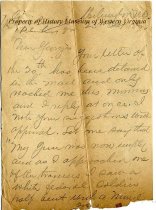
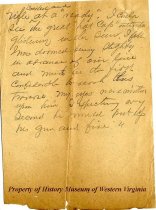
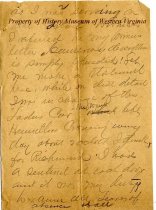
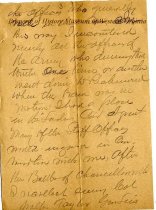
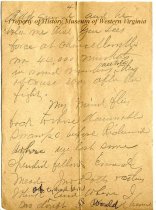
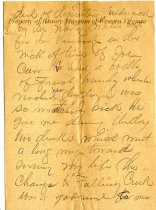
Additional Images [23]
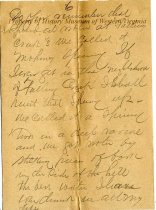
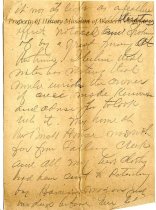
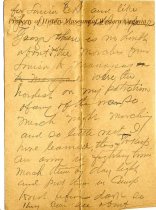
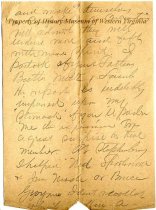
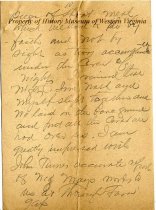
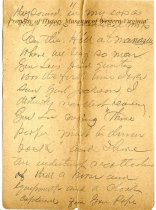
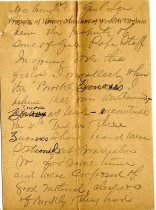
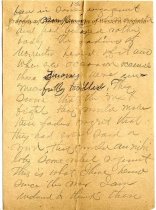
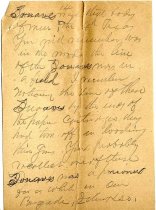
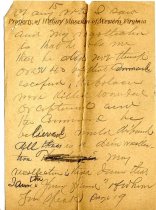
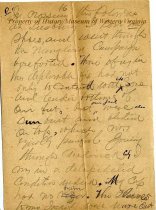
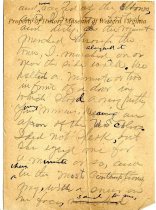
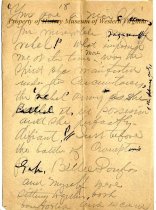
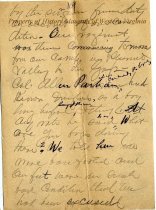
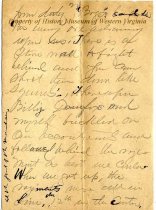
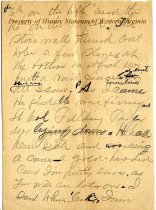
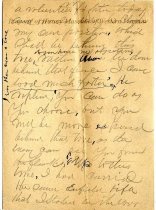
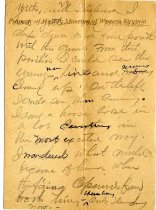
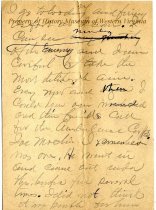
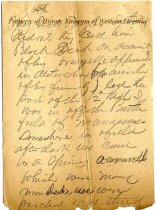
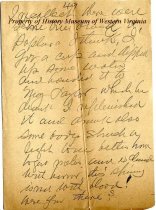
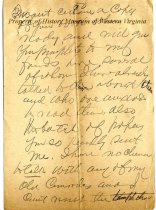
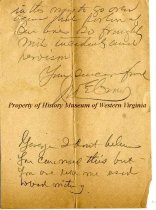
Metadata
Title |
John E. Crow letter of October 23, 1892 |
Dates of Creation |
October 23, 1892 |
Scope & Content |
These 28 pages are written in pencil. The first page has writing on the back, which becomes page 2. After page 24, there is a jump in the page numbering which suddenly goes to page 48. The reason for this is unknown. Crow received a letter from Bernard and is responding. He mentions that he approves of Bernard's suggestions. The first part relates to an incident when Crow stated his gun was empty as he approached the traverse. He saw a Federal soldier with his rifle cocked and ready. He felt doomed, as he was probably the first Confederate to reach the traverse, and he expected the soldier to fire. Crow then goes on to another subject. His story begins as he was serving on rail detail and was in charge of the "Ladies Car". The train left Hamilton's Crossing every day at 2:00 P.M. for Richmond. The train had a sentinel at each door and it was his duty to examine all leaves of absence of all officers who rode in that car. He encountered most of the officers of the Army, who at one time or another went to Richmond. When the train was in motion, he had a seat in the "Ladies Car". Most officers would engage in conversation with Crow. After the Battle of Chancellorsville, Walter Taylor, who was the Adjutant General to Gen. Robert E. Lee, told him that General Lee had 44,000 muskets after the fight. He next remembers the horrible swamps that lay before Richmond, where the army lost many a splendid soldier. (He mentioned some names). Crow also thinks of the typhoid fever that came from the poor quality of water, and notes that he would have died from dysentery except for the kindness of Joe Carr. Joe had received a bottle of French brandy on the day Crow was sick. Joe gave him two drinks during the day, and Crow is sure it went toward saving his life. The change (of location) to "Falling Creek" was a godsend to Crow. He remembers it being called Mahone's Springs. It was in a deep ravine and they got water by sticking pieces of bone in the side of the hill, but it was the best water he had ever drunk. Its exhilarating effect was noticed by many. Crow believes the water could enrich the owner of the property. Crow's home was not far from Falling Creek, and all his best clothes were sent by Harrison's wagon just two days before the regiment left for Louisa Court House. He believes the marches from Louisa to Manassas taxed the patriotism of him and of other men. He feels that to keep an army in fighting trim it is best to march by daylight and set up camp before dark. The men would endure more and fight with more spirit. Where the men went into camp Crow says he had some of Bernard's "buttermilk" which impressed his stomach. At Stevensburg, he helped three of his comrades. #[What Crow writes here is not clear but it was at night and it rained]#. He and his friend slept on the bare ground and pulled the covers over them. Crow says he was greatly impressed with John Turner's report on what Major Mays said at Thoroughfare Gap and repeated again on the hill at Manassas, where the men lay near General Lee's headquarters. This was the first time Crow had seen General Jackson and he recollects the words of General Lee. "Those people must be driven back." Crow also recollects seeing a horse, equipment, and a cloak, captured from Union General Pope, being brought to General Lee, or it may have been the property of some of his staff. While going over the field of battle Crow recollects where the Brooklyn Zouaves encountered the 4th Texas. The Zouaves were made up of good men, who were mostly clerks from Brooklyn. They had been in some engagement before camping at Warrenton, Virginia, and had behaved badly. The ladies of Warrenton heard of it and when the occasion came these Zouaves were unmercifully twiddled. The Zouaves swore that in the next fight they would make these ladies regret that they had ever said a word, and that they would annihilate some rebel regiment. That at least is what Crow had heard, since the War. He is inclined to think the Zouaves he saw lying on the field after the battle were these men. He asks if Bernard remembers the 4th Texas being in the woods, and the line of the Zouaves in the field. Crow remembers watching the line of Zouaves and the line of paper cartridges they had torn off when loading their guns. One of the Zouaves was a prisoner for a while in the brigade. Crow remembers talking with one of them, who had said he thought that fewer than 40 of their command had escaped. The balance were killed, wounded, or captured, and he believed the command would be disbanded. Crow then refers to something Bernard had written previously, in which he mentioned a "Young Friend". Crow believes he is that young friend. Crow continues. He remembers crossing the Potomac at Leesburg, Virginia, where he lost his shoes, which made him go through the Maryland Campaign barefooted. Those who were in the same fix not only had to contend with the sore and tender bottoms of their feet, but their feet were sunburnt and blistered on the top. Going through Frederick City, Maryland, he was in a dilapidated state. His cap had no brim, the sleeves of his jacket were worn out and ragged at the elbows. He was barefoot and dirty. As the regiment marched through the town, he marched on or near the sidewalk. When the regiment halted, he remembers a young woman standing in the doorway near him. She wore an apron of the U. S. colors. Crow did not speak, but the young woman eyed him for a minute or two, and then with a sneer on her face said, "You are a nice specimen, you miserable ragamuffin rebel!" What impressed Crow was her spirit under the circumstances. The "rebel" army as she called it, was in possession of the city, and there she stood perfectly defiant. Just before Crampton's Gap, Crow and Billie Douglas were sitting both barefooted, and excused by the surgeon from duty because of their condition. The regiment was moving from the camp in Pleasant Valley to the Gap. Colonel Parham, in command of the brigade, had known Douglas as a boy long before the war. The Colonel said, "What are you boys doing there?" They responded that they were barefoot, that their feet were in bad condition, and that they had been excused from duty. The colonel told them that the enemy were advancing, that there was a stone wall behind which they could fight, and that they could shoot the enemy like shooting squirrels. Crow and Douglas buckled on their gear and followed behind the regiment as best they could. When they got to the front, all the regiments were in line, with the 12th in the center. The 6th was on the left, and the 16th on the right. The stone wall turned out to be a few stones at the bottom of the mountain, on which was built a rail fence. As Crow and Douglas approached, the pickets were firing and Lieutenant Colonel Taylor was lying down. He had been sick and was using a cane, a gold-headed cane. Crow told him, "Colonel, I am a volunteer fighter today and would like to choose my own position, which shall be behind this tree, if you have no objection, rather than lie down behind that fence. I can load much faster." The colonel replied, "You can do as you choose, but you will be more exposed behind that tree, as the enemy can see you from the flanks." Crow then goes on to say that up to that time he had carried the same Enfield rifle with which he had started the War, and he had perfected his marksmanship down to a fine point. From where he was, he could see the enemy's main line and the reserves coming up. He could also see a loose horse in a field, and wondered what would happen to the animal. When the firing started, there being only skirmishing going on at that time, he commenced loading and firing as fast as he could. He could see the enemy, and he took careful aim. He also could hear the cries of the Confederate wounded, calling for the Ambulance Corps. He remembers Joseph Maclin being one of the Ambulance Corps. He went in and came out several times, under terrific fire . Crow did not think it possible for him.... The top of the page has the page number 24 - the next page then skips to page 48. The letter picks up with ... Major Dick Taylor (Crow makes a comment about Major Taylor's family, but Crow's writing is poor.) led the part of the 12th Virginia of which Crow was a member, off the battlefield at Manassas, somewhere into a field. After dark, they came to a spring where there were many wounded. They, including Crow, were parched with thirst, and they were surrounded by poplar trees. Crow got a cup of water and gave it to Major Taylor. He then replenished it and drank, himself. At that point someone struck a light to see better. (Crow's writing again becomes poor and only some words can be determined.) With horror, ...they noted ...this spring was filled... with blood. Crow closed his letter by asking Bernard for a copy of his book when it is ready, and says that he will give out Bernard's pamphlets to his friends, who are anxious to read them. Crow also says that he does not have the chance to talk with any of his old comrades, and he can't forego the temptation to communicate in this way (letter-writing) to go over again that portion of our lives fraught with incidents and heroism. Crow also makes the comment that he doesn't think Bernard can read his letter but that Bernard, like Crow, is used to bad writing. |
Year Range from |
1892 |
Creator |
Crow, John E. |
Year Range to |
1892 |
Subjects |
Absence Accouterments Aim Aprons Barefoot Blister Blood Bottles Brandy, French Brigade Buttermilk Camp Cap Captures Cartridge Civil War Civil war battles Clerks Cloaks Colonel Comrades Confederate Army Confederate officers Confederate soldiers Confederate veterans Conversation Copy Cup, Tin Detail (military) Duty Dysentery Ears Elbow Enemy Enfield rifle Engagement Equipment Federal troops Feet Field Fight Fire (weapons) Flank Friends Gaps Guns Hat Headquarters, Military Heroes Hills Horse Jackets Killings Ladies Leave-takings Letter writing Letters Line (military) Mail delay March, Military Marksmanship Muskets Neighborhoods Pamphlets Patriotism Picket line Pickets (Guards) Poplar trees Prisoner Property Ragged Rebels Rail fence Railroad Railroad train Railroad travel Rain Rainfall Ravines Rebels Recollection Regiments Reminiscences Report Reserve Rifles Sentinels Shoes Sick Side walks Skirmishers Sleeve (clothing) Soldiers Specimens Spring (water) Squirrels Staff officer Statement Stomachs Stone walls Sunburns Surgeons Swamps Town Trains Traverses Tree Typhoid fever Volunteer War Water Women Woods Word |
Search Terms |
12th Virginia Infantry 16th Virginia Infantry 2nd Manassas 4th Texas Infantry 6th Virginia Infantry Ambulance Corps Battle of Chancellorsville Battle of Crampton's Gap Battle of the Crater Bread basket of the Valley Brett House Brooklyn, New York Campaign Chancellorsville, Virginia Civil War Confederacy, the Confederate Army Confederate Veterans Crampton's Gap, Maryland Crater (Petersburg) Falling Creek, (near Manchester, VA) Fourth Texas Infantry Frederick City Leesburg, Virginia Louisa Court House Mahone's Brigade Mahone's Springs Manassas, Virginia Maryland Petersburg, Virginia Pleasant Valley Potomac River Second Battle of Manassas [Bull Run] Sixteenth Virginia Infantry Sixth Virginia Infantry Stepping, [Virginia] Thoroughfare Gap Twelfth Virginia Infantry War Between the States War Talks of Confederate Veterans Warrenton, Virginia Zouave |
People |
Bernard, Geo. S. Bernard, George S. Carr, Joe Douglas, William E. (Billie) Guynn, Upton Bruce Jackson, Thomas Jonathan Lee, Robert Edward Maclin, Joseph J. (Joe) Mahone, William, Major General Mays, John Pegram Meade, Everard Nash, James Edward (Jim) Nash, [James E.] Parham, Allen Pope, John (General) Potts, John H. Spottswood, Joseph Edwin (Ned) Taylor, Fielding Lewis Taylor, Richard Taylor, Walter Turner, John |
Event |
Civil War |
Collection |
George S. Bernard Collection |
Imagefile |
025\200975156-1.JPG |
Number of images |
29 |
Object Name |
Letter |
Object ID |
2009.75.156 |
Extent of Description |
28 pages, size 5" x 7" |

